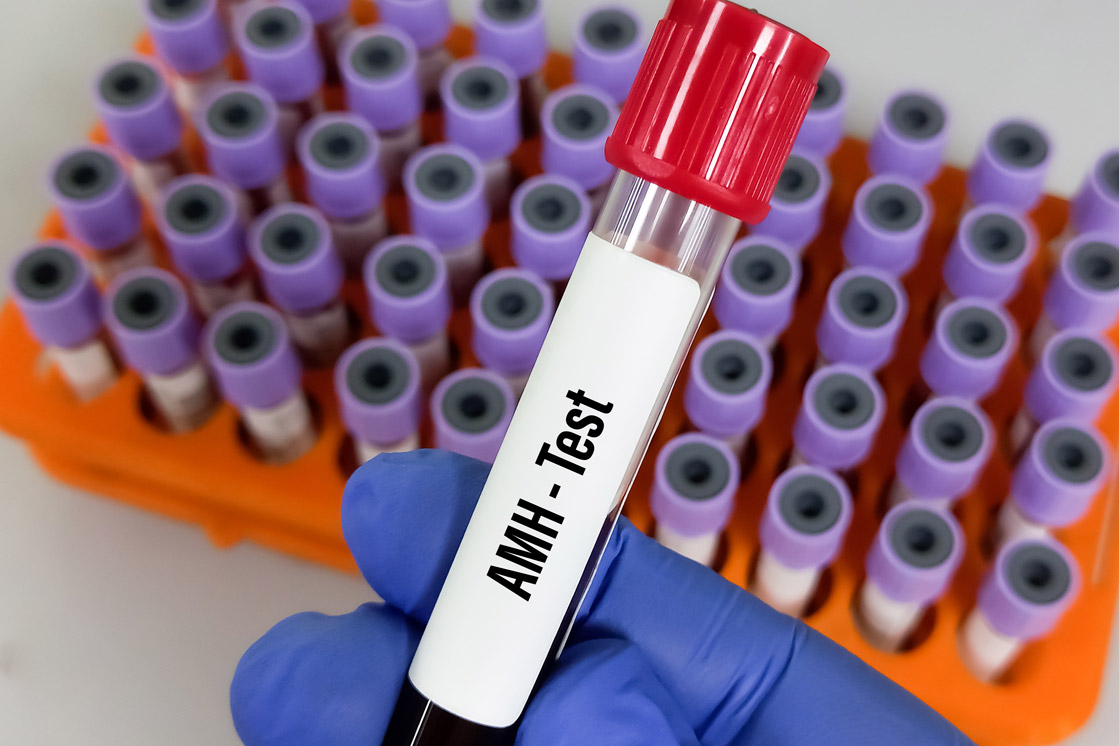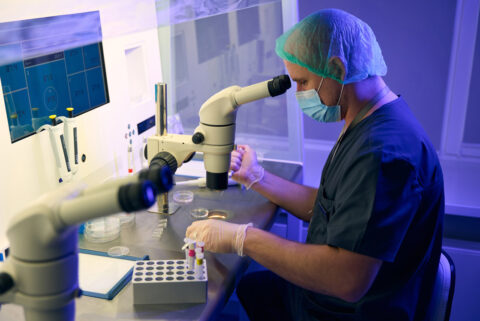Here at The Fertility & Gynaecology Academy, we are frequently asked about whether there is a need to have genetic testing with IVF treatment.
Dr Amin Gorgy, Fertility Consultant, at The Fertility & Gynaecology Academy, explains: “Genetic testing isn’t something that all patients need, but in some cases it may be strongly recommended alongside IVF, particularly for older mothers, those with unexplained recurrent miscarriage, and patients with a family history of genetic disease.”
Genetic testing and IVF go hand in hand as once the embryos have been tested, they will need to be implanted back into the uterus using IVF. There are two categories of testing available at the clinic: Pre-implantation Genetic Screening (PGS) and Pre-implantation Genetic Diagnosis (PGD). These are two different tests performed on embryos (fertilised eggs) to determine if they have any genetic diseases.
An embryologist, who is highly trained and skilled in the precision techniques required for biopsy, will use advanced technology and special tools to hold each embryo still and remove a few cells under a microscope. The embryologist will then test the cells using either PGS or PGD and will select the most viable embryos for transfer. Only the embryos without any signs of genetic diseases will be used for IVF.
The Fertility & Gynaecology Academy is one of very few clinics in the UK that offers this testing on site at the clinic. Our lab team team, which includes highly experienced embryologists, works from our state of the art laboratory within the clinic.
What is the difference between PGS and PGD?
PGS – also known as pre-implantation genetic testing for aneuploidy (PGT-A) or aneuploidy screening – involves detection of numerical chromosomal abnormalities in an embryo. Some of the most commonly know chromosomal abnormalities include Down’s Syndrome, Edwards’ Syndrome, and Patau’s Syndrome. PGS is usually recommended for patients that have experienced recurrent miscarriage, implanatation failure, or have history of a serious genetic disease in their family and want to avoid passing it on to any children.
PGS (PGT-A) involves removal of cells from the embryo through a biopsy. These cells are then analysed for aneuplioidy – having too few or too many chromosomes. PGS (PGT-A) screens for all 23 pairs of chromosomes within an embryo. This allows the embryologist to find embryos that may fail to implant, causing miscarriage and/or repeated unsuccessful cycles of IVF.
The British Medical Journal has highlighted that there is extensive evidence base to support the efficacy of PGS; studies show that PGS can improve implantation and live birth rate per embryo transferred.
PGD differs to PGS in that it can detect a specific defect in the chromosomes or the genes that might be inherited from the parents. There are two different tests for:
- Unbalanced chromosomes; Pre-Implantation Genetic Testing for Chromosomal Structural Rearrangements (PGT-SR).
- Genetic conditions that result from a single mutated gene; Pre-Implantation Genetic Testing for Monogenetic Disease (PGT-M).
Unbalanced chromosomes usually end in miscarriage or implantation failure. PGT-M can test for more than 400 different conditions, including cystic fibrosis, Huntington’s disease and Tay Sachs. The testing process involves removing cells from the embryo. The cells are then tested for the presence of a gene mutation or unbalanced chromosomes. Embryos without any abnormalities are implanted back into the uterus.
PGD (PGT-M and/or PGT-SR) can also be carried out for couples who don’t have fertility problems, but as the embryos will need to be tested in the laboratory, it is necessary to have IVF to implant the embryos back into the uterus where they can continue to develop. PGD is usually recommended when one of the parents has a family history of genetic disease.
Studies show that PGD can help in selection of high-quality embryos and improve infertile couples’ chances of conception and carrying a baby to term.
Is genetic testing accurate?
Genetic testing is generally considered very accurate. The accuracy rates vary slightly, but they are very high. Typically, accuracy of PGT is 98% if the right test is done for the verified problem.
However, that being said, nothing is 100% accurate and so there is a minute risk of the tests not working or incorrect results. PGS and PGD do both come with the very minimal risk that some embryos may be damaged during the testing process, which means they would not be able to be used for implantation.
Is genetic testing safe?
Genetic testing is thought to be very safe and there is currently no evidence to show that babies born following testing have any increased health problems or developmental issues than babies born using IVF alone.
Despite this, patients wanting to go ahead with PGS or PGD testing should be made aware of the risks that are associated with IVF; these include having a multiple pregnancy (twins or triplets), and potential adverse reactions to fertility drugs.
Should I have genetic testing with IVF?
There are certain situations where it can be beneficial to undergo genetic testing. This will vary on a case by case basis, though broadly speaking, your fertility specialist may recommend genetic testing for:
- Women over 35 having IVF.
- Women who have experienced recurrent miscarriage.
- Women who have experienced multiple IVF failures.
- If either partners have a serious genetic condition or chromosomal condition in the family and don’t want to risk passing it on to their children.
- Women who have had previous pregnancies which have ended as a result of a genetic condition.
- Couples who already have a child with a genetic condition.
If you’d like to discuss genetic testing and/or fertility treatment at The Fertility & Gynaecology Academy, you can email us on info@fertility-academy.co.uk or call us on 020 7224 1880. We are happy to answer any questions you may have and invite you to attend our open day which we hold twice a month.







